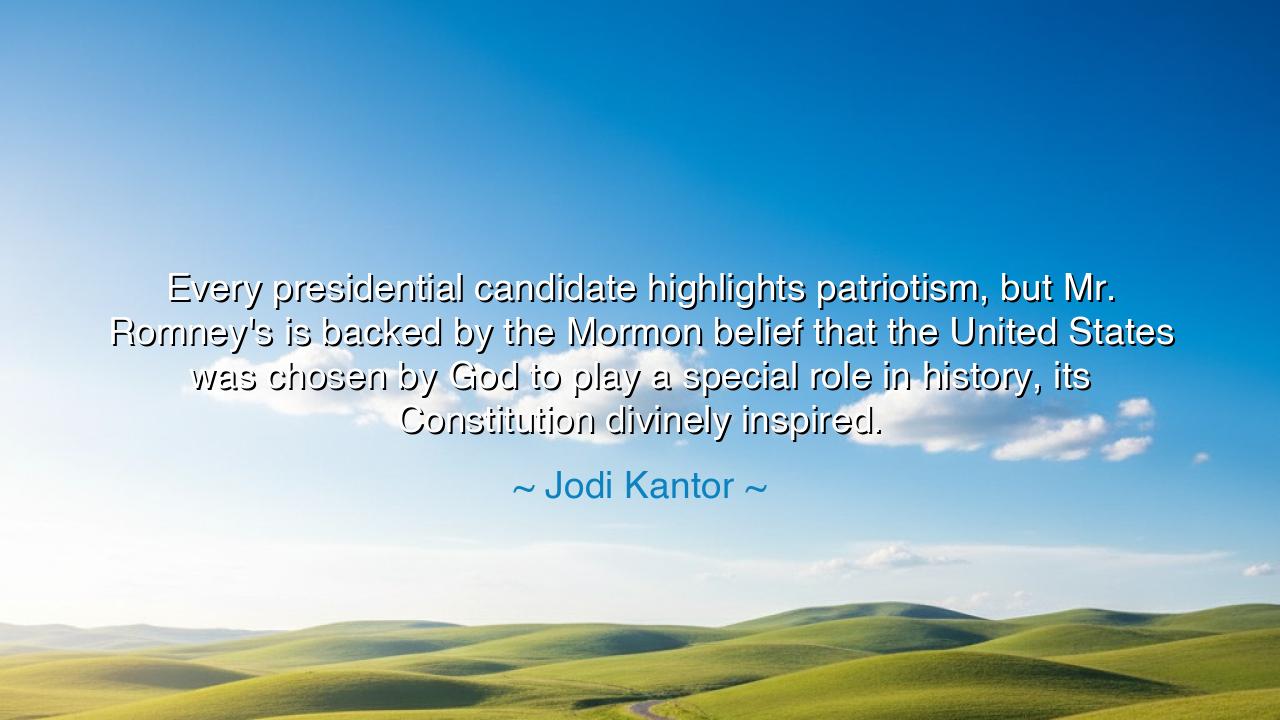
Every presidential candidate highlights patriotism, but Mr.
Every presidential candidate highlights patriotism, but Mr. Romney's is backed by the Mormon belief that the United States was chosen by God to play a special role in history, its Constitution divinely inspired.






“Every presidential candidate highlights patriotism, but Mr. Romney's is backed by the Mormon belief that the United States was chosen by God to play a special role in history, its Constitution divinely inspired.” Thus wrote Jodi Kantor, speaking not only of one man’s campaign but of the deeper union between faith, nation, and destiny. In these words lies a reminder that patriotism is not always born from mere pride or loyalty alone, but may be kindled by sacred conviction—the belief that one’s land has been entrusted with a divine mission, and that its institutions are not the work of mortals only, but of heaven’s guiding hand.
The origin of this reflection rests in the American story itself, a nation long bound to the idea of providence. From the Puritan settlers who called their colony a “city upon a hill,” to the revolutionaries who declared that all men are endowed by their Creator with inalienable rights, Americans have often seen their history not as accident but as destiny. When Kantor speaks of Mormon belief in the divine inspiration of the Constitution, she points to a tradition that holds America as chosen—a vessel through which liberty and self-government were meant to flourish for the sake of the world.
History is filled with moments when nations believed themselves chosen. Consider the ancient Israelites, who saw in their covenant with God not only protection but a sacred duty. Through exile, through trial, through the rise and fall of kingdoms, the belief that their nation was chosen gave them strength. So too, the early Americans, faced with the overwhelming might of empire, dared to believe that providence was on their side, that their cause was not merely political but eternal. It was this conviction that carried them through the dark winter at Valley Forge, through sacrifice and blood, until freedom was secured.
Yet Kantor’s words remind us of the tension between common patriotism and sacred patriotism. Every candidate may wave the flag, speak of honor, and extol the greatness of the nation. But when one binds that patriotism to the belief that the land itself was ordained by God, the emotion takes on a deeper force. It is no longer pride alone, but purpose; no longer duty alone, but destiny. Such a belief can inspire noble sacrifice, as men and women give themselves wholly to a cause they deem holy.
But wisdom demands caution. For while the belief in a divine mission can unite a people and call them to greatness, it can also blind them to humility. History shows that many empires claimed heaven’s blessing—the Romans, the Crusaders, the colonizers—only to fall into arrogance, believing themselves incapable of error. Thus, Kantor’s observation is also a subtle warning: when patriotism is fused with sacred conviction, it becomes both powerful and perilous.
The lesson for us is clear: honor your nation, cherish its ideals, even believe in its destiny—but temper pride with humility, and power with justice. To see one’s Constitution as divinely inspired is to hold it in reverence, but also to guard it from corruption and neglect. For if indeed a nation is chosen, its responsibility is greater, not less. Its citizens must embody the virtues of fairness, courage, and compassion, lest they betray the very calling they proclaim.
Practical actions flow from this teaching. Do not let patriotism be an empty chant or shallow symbol. Ground it in service—by defending justice, by aiding the weak, by protecting the liberties of all. Let faith, if you hold it, call you not to arrogance, but to stewardship. Live as though your nation truly were chosen, not for its glory alone, but for the good it can bring to the world.
So let Kantor’s words echo as a reminder: “Every presidential candidate highlights patriotism…” but let yours be a patriotism not of words only, but of deeds—noble, humble, and enduring. For if a people truly believe their history is touched by the divine, then their lives must prove it. And in proving it, they shall give to their nation not only pride, but purpose.






AAdministratorAdministrator
Welcome, honored guests. Please leave a comment, we will respond soon